
Year-end report card gives Georgia employers a B grade for 2020 and clarity on how to earn an A in 2021
goBeyondProfit’s November survey of working Georgians uncovered the path to an A grade.
Employees most want to see their companies and leaders demonstrating empathy and care for employees and the community. For quick wins, leaders should prioritize being visible and accessible, with transparent employee communication. Gap analyses and cautionary tales suggest leaders focus on empathy, racial/social conversations and disconnected employees’ bonds.
Overall, emotional intelligence rises as a top skill required for leaders going into 2021.
Employees trust their employers to manage uncertainties in the year ahead and increasingly rely on the workplace as a pivotal source for emotional and social wellbeing.
Overall grade for 2020
Employers had no roadmap for the waves of physical, emotional and social upset that roiled their business in 2020, so it’s great to hear Georgia employees are quite satisfied with how companies managed.
44% of employees give their employers an A on addressing the challenges of 2020. Another 36% give them a B. Overall, the average came in at a solid B average.
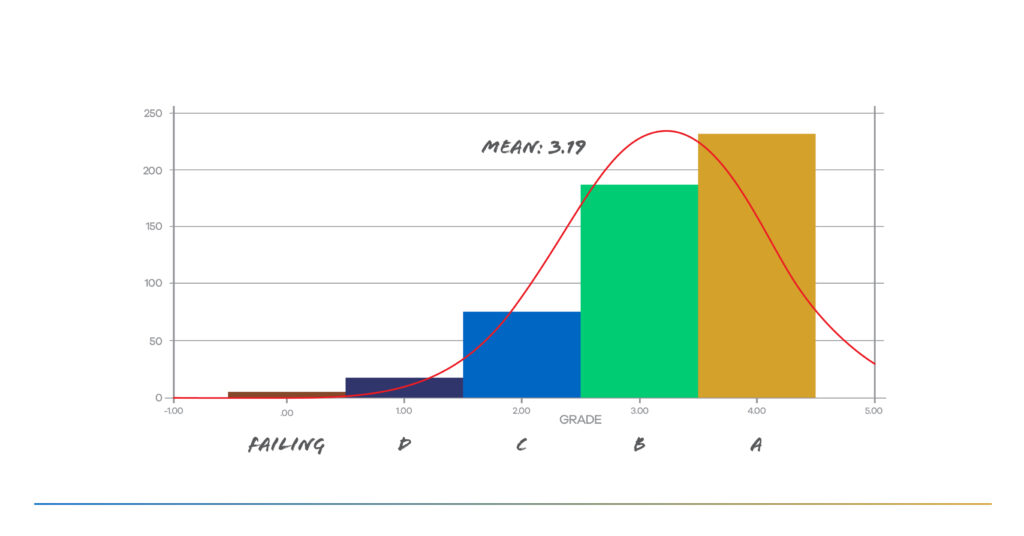
Company and Leadership Behaviors to prioritize in 2021
In 2021, employees want to see their employer demonstrate care and instill purpose. In order of importance, (counting how many say it is Very/Somewhat Important that they see these) companies are advised to demonstrate care, help the community, instill purpose, address racial issues, and of course, adapt the business to market shifts.
When asked what they want to see their leaders personally demonstrate in 2021, accessibility, transparency and empathy topped the charts. In order, it’s Very/Somewhat Important to them to see their leaders be accessible, transparent, empathetic toward company and community and address social issues of importance.
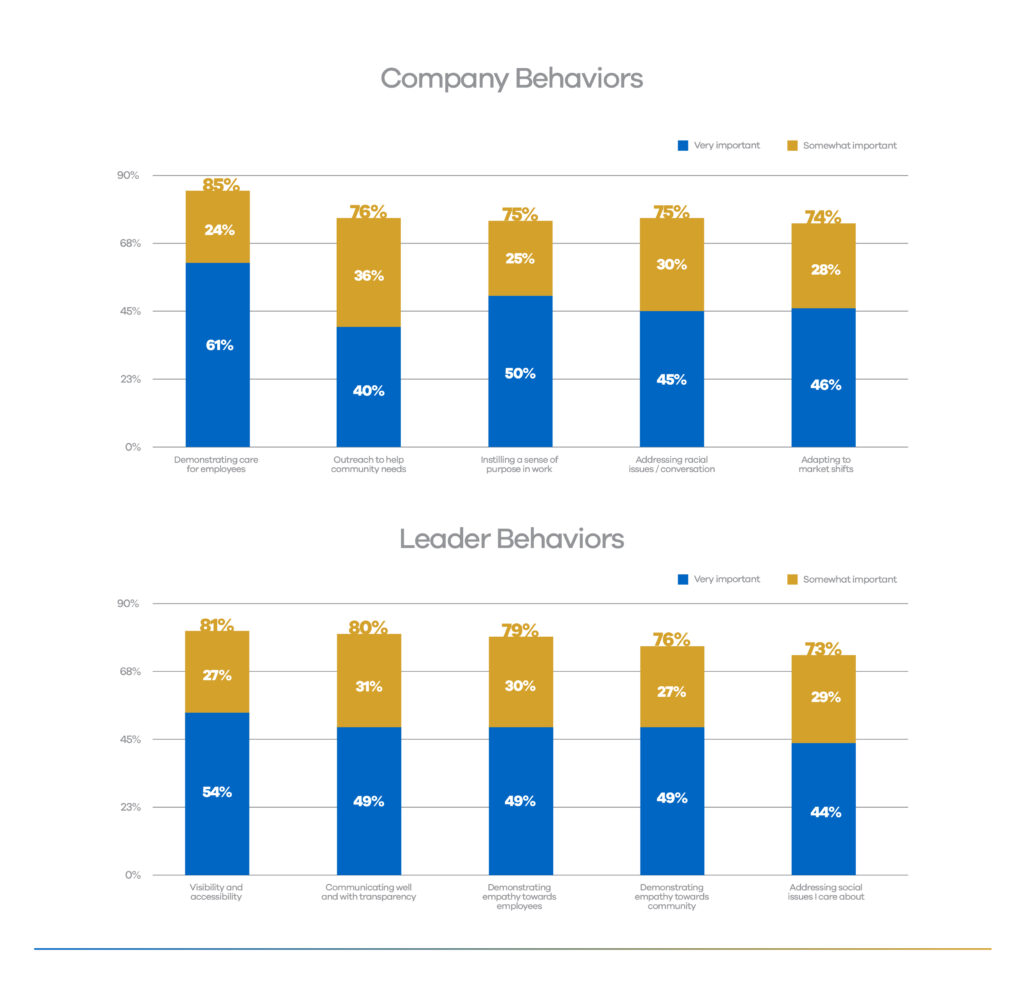
Gap analysis highlights opportunities
For the most part, employers are doing well on delivering on what matters to employees. Majorities gave Good/Excellent scores for performance ranging from the lowest percentage (60%) for Addressing racial issues/conversation up to the highest (75%) for Demonstrating care for employees.
As they consider their leaders’ specifically, the lowest percentage (60%) gave Good/Excellent scores for Addressing social issues I care about and the highest percentage (73%) acknowledged Visibility and accessibility.
Across the behaviors, we see two significant opportunities for leaders to strategize into the gaps when behaviors are highly important but corresponding ratings are low.
The empathy gap
The largest gaps appear where employees highly value empathy toward employees and community yet relatively small numbers of respondents rate their employers as Good or Excellent on these. The disparity results in performance gaps of 18 and 14 points respectively.
Employees are watching senior executives personally for concern for both employees and the community. To meet these social and emotional wishes, leaders do well to routinely deliver empathetic communications regarding health, appreciation, community needs and business pivots. Frequent messages of kindness from executives and managers will pay off in employee cohesion and productivity.
The call for racial and social conversation
High majorities of respondents feel addressing racial and social issues are important (75% and 73%) and register performance gaps of 15 and 13 points respectively.
Unsurprisingly, Black and Caucasian respondents graded employees differently on the topic of race. On the question of Addressing racial issues and conversation, Black employees are more likely than white employees to rate their employer as Poor/ Terrible (20% vs. 10%) while white employees are more inclined to give an Excellent or Good (68% vs. 52%). Black employees are also more likely than white respondents to rate their senior leader as Terrible at Demonstrating empathy towards members of the community (13% vs. 5%).
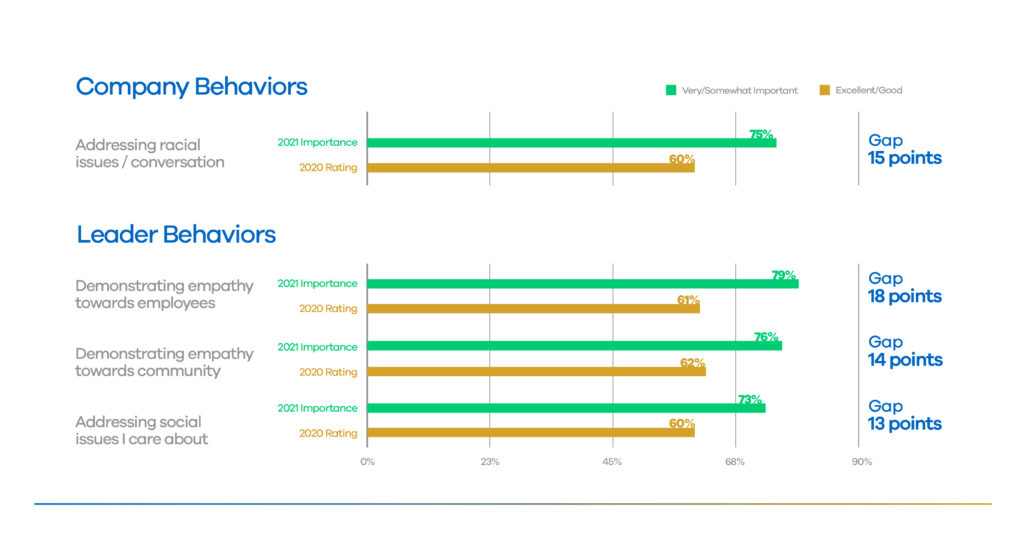
Connectivity at work
Despite (or perhaps due to) the turmoil of 2020, 55% of employees are feeling much/somewhat more connected at work. Employees feel their connection increased most with the company itself (60%), then fellow employees (53%) and their manager (52%).
The real cautionary tale lies with the 12% who feel somewhat or much less connection. This is reflected in reduced connection with their manager (13%), fellow employees (12%) and their company (10%).
The relatively lower score for connection with managers should elicit leaders’ attention as well, since data has long shown that employees’ relationship with their manager is a key retention trigger. For empathy and care to be felt and appreciated, it must be present in employees’ daily lives with the person most responsible for their professional growth and job performance.
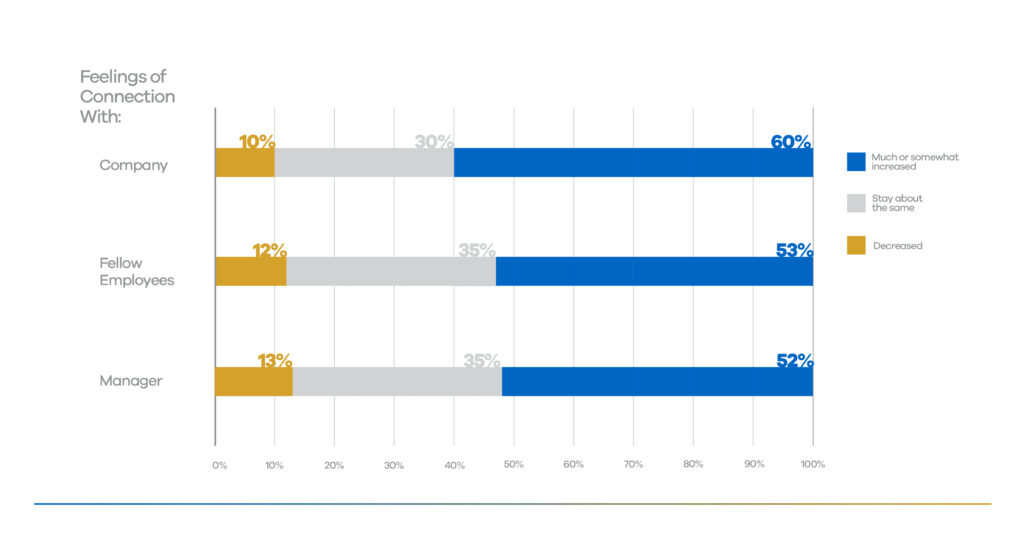
Recognizing individualized needs
Experts and best practices remind us that no two employees have the same needs or priorities. The data backs this up.
Open-ended answers about the one thing employees most want from their employer right now covered the full gamut of needs any leader would expect:
- 22% want financial or other specific support
- 11% want workplace/time flexibility
- 7% want health protections and insurance
- 16% want empathy, transparency, gratitude
- 9% see no changes needed
- 3% want personal and corporate growth
No leader would realistically attempt to appease every employees’ individualized desires, but it is important to find ways to help employees feel heard and recognized.
This points to the critical need for leaders to prioritize listening throughout the management chain, to empowering managers with certain levels of individual care, and to be personally attentive and responsive to the unique pressures of their workforce. Check-ins not only help employees feel recognized, they also provide leaders a better sense of what to prioritize.
As leaders consider the make-up and needs of their teams, they might benefit from watching for trends among them. Some of the statistically significant differences the survey showed include the following.
- Older employees (55+) give lower grades on addressing the challenges of 2020 and have lower trust in company leaders to address Coronavirus impacts well.
- Younger employees (18-34) give their employers lower scores for addressing racial issues/conversations, but feel a more improved sense of connection to the company, their manager and employees.
- Gen X employees (35-54) greatly value employer care, placing a higher importance on eight out of 10 attributes tested.
- Employees outside the Atlanta area are more likely to give top ratings for employer outreach to meet community needs (71% vs. 61%), and feel more connected to their companies and managers, but are more likely to give the lowest ratings for adapting to market shifts (15% vs. 7%).

A trust tailwind
Finally, as we head into the turn of this unprecedented year, the data shows leaders have a solid tailwind of employee optimism.
A full 69% of employees trust the leaders of their company to address Coronavirus impacts well next year. We hope these insights help you deliver generously on that trust with strong business value in return.
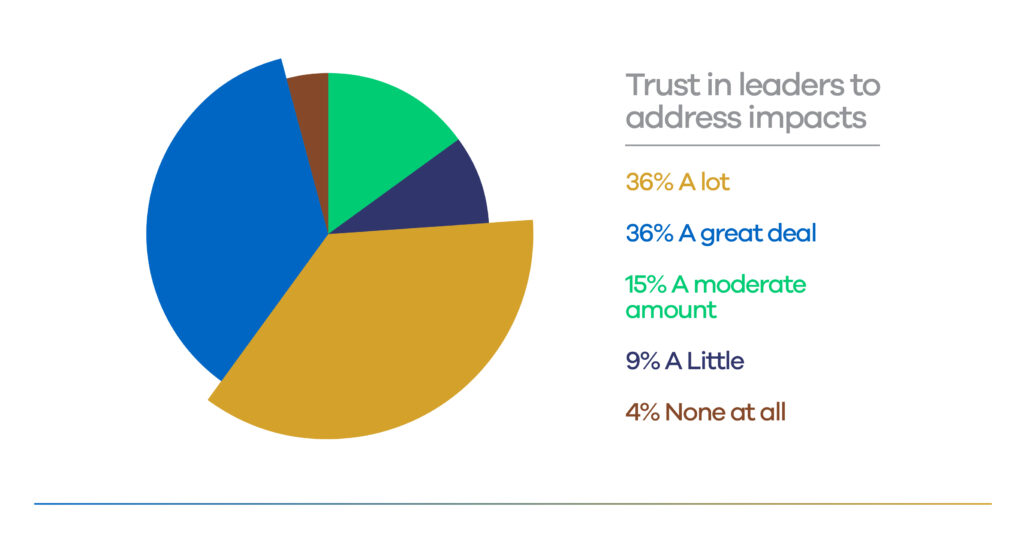
Insights to Care for Employees:
goBeyondProfit’s mission is to help Georgia CEOs know how best to implement strategic corporate generosity, caring for their people and communities in ways that improve lives and enhance business value.
The events of 2020 have elevated the imperative to care for employees in that equation. As is the case worldwide, Georgia employees are experiencing various levels of emotional and professional distress which can impact their effectiveness at work .To provide specific help, we surveyed working Georgians to clarify what our state’s business leaders should prioritize in caring for their people in the year ahead.
Methodology
An online survey was conducted among employed Georgians between November 5-11, 2020. GoBeyondProfit contracted with Dynata, a provider of first-party data contributed by people who opt-in to participate in surveys and market research, for the sample. Respondents qualified for the survey if they were employed by a company that has a Georgia presence or a Georgia office. Respondents indicated their work was in the full range of workplace environments from office to manufacturing. The survey drew 520 completes. At the 95% confidence level, the survey has an error range of +/- 4.3%
goBeyondProfit
goBeyondProfit is a statewide alliance launched by business leaders for business leaders to spur strategic corporate generosity and improve people’s lives. Through peer insights and stories, members learn from one another and strengthen their ability to ensure stronger businesses and healthier communities. goBeyondProfit is a fully funded philanthropic venture inviting every Georgia business to join at no cost.
